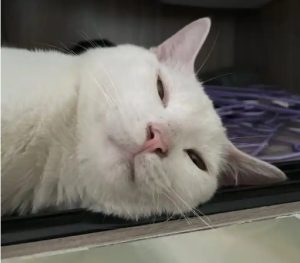How to Identify Poisoning Symptoms
After eating a poisoned mouse, cats may exhibit symptoms such as vomiting, diarrhea, reduced appetite, lethargy, rapid breathing, convulsions, and bleeding. These symptoms usually appear within hours of ingestion and vary depending on the type of poison.

How to Handle a Cat That Has Eaten a Poisoned Mouse
What to Do Immediately
Stay Calm
First, stay calm and don’t panic. Observe and record your cat’s symptoms to provide accurate information to the veterinarian.
Isolate the Cat
Separate your cat immediately to prevent further contact with the poison and to protect other pets or children.
Induce Vomiting
Within two hours of ingestion, you can try to make your cat vomit. Use a 3% hydrogen peroxide solution at a dose of 1 to 2 ml per kilogram of body weight. Administer it slowly with a syringe into the back of your cat’s tongue. Vomiting should occur within a few minutes. If it doesn’t work or if your cat shows severe symptoms, stop and go to the hospital immediately.
Contact a Veterinarian
Call your vet right away, whether your cat shows symptoms or not. Provide details such as your cat’s age, weight, the type of poison, and when it was ingested. Follow any initial treatment advice they give.
Collect Information
Have information ready about the poison, including its type and active ingredients. This helps the vet prepare the right treatment.
Take the Cat to the Hospital
If your cat has severe symptoms like seizures or breathing problems, or if you can’t identify the poison, take it to the vet hospital immediately.
Professional Medical Treatment
At the vet’s, your cat may receive activated charcoal to absorb toxins, fluids to support bodily functions, and specific antidotes based on the poison. In severe cases, hospitalization and intensive care may be needed.
Aftercare
Follow-Up Visits
Take your cat for regular check-ups as advised by the vet. Blood tests may be needed to monitor liver and kidney function.
Monitor Your Cat
Watch your cat closely at home. Report any changes in behavior, appetite, or symptoms to your vet immediately.
Provide a Comfortable Environment
Keep your cat in a quiet, comfortable place to recover. Minimize stress by avoiding loud noises and bright lights.
Adjust the Diet
Feed your cat high-quality, easily digestible food as recommended by your vet to aid recovery.
Prevent Re-Exposure
Store all chemicals and medications safely out of your cat’s reach to prevent future incidents.
Prevention
Check your home regularly for signs of rodents. If you find any, control them without using poison. Use humane traps instead.
In summary, if your cat eats a poisoned mouse, act quickly and correctly. Stay calm, follow veterinary advice, and get professional treatment as soon as possible. Also, take preventive measures to keep your cat away from toxins.
